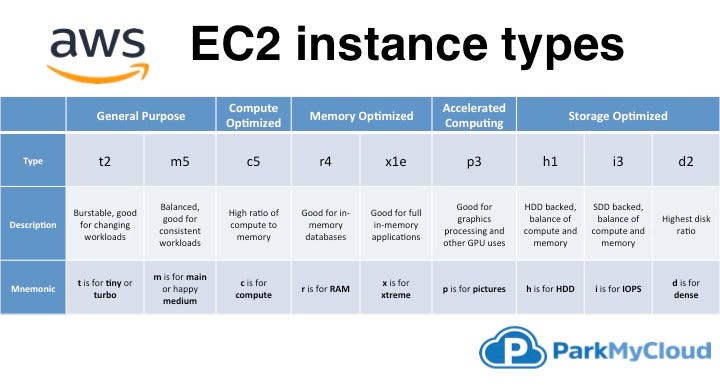Understanding AWS EC2 Instance Types
Amazon Web Services (AWS) offers a wide range of EC2 instance types to cater to different workloads and applications. Choosing the right instance type is crucial for optimizing performance and cost efficiency. In this article, we will explore the various EC2 instance types and their characteristics.
Families of EC2 Instance Types
EC2 instance types are grouped into families based on their intended use cases. Each family is designed to meet specific performance requirements and offer a balance of compute, memory, and storage resources. Some of the popular EC2 instance families include:
- General Purpose Instances
- Compute Optimized Instances
- Memory Optimized Instances
- Storage Optimized Instances
- Accelerated Computing Instances
General Purpose Instances
General Purpose instances are versatile and suitable for a wide range of workloads, such as web servers, development environments, and small databases. They offer a balance of compute, memory, and networking capacity at an affordable price point. T3, M5, and A1 instances are popular choices in this category.
Compute Optimized Instances
Compute Optimized instances are ideal for compute-intensive workloads that require high processing power. These instances are optimized for tasks such as batch processing, gaming servers, and scientific modeling. C5, C4, and C3 instances are popular choices in this category.
Memory Optimized Instances
Memory Optimized instances are designed for memory-intensive workloads, such as databases, in-memory caching, and real-time analytics. These instances offer a high memory-to-CPU ratio to support data-intensive applications. R5, R4, and X1 instances are popular choices in this category.
Storage Optimized Instances
Storage Optimized instances are tailored for workloads that require high storage capacity and I/O performance. These instances are ideal for data warehouses, distributed file systems, and big data analytics. I3, I2, and D2 instances are popular choices in this category.
Accelerated Computing Instances
Accelerated Computing instances are designed for workloads that require fast computation using specialized hardware accelerators, such as GPUs or FPGAs. These instances are used for machine learning, encoding, and HPC applications. P3, G4, and F1 instances are popular choices in this category.
Conclusion
Choosing the right EC2 instance type is crucial for achieving optimal performance and cost efficiency in the cloud. By understanding the characteristics of each instance family and selecting the right type for your workload, you can maximize the benefits of AWS EC2 and enhance your cloud computing experience.
The wide range of EC2 instance types offered by AWS caters to diverse workloads and applications, providing flexibility and scalability for businesses of all sizes. Whether you need a general-purpose instance for basic computing tasks or an accelerated computing instance for specialized workloads, AWS has a solution to meet your needs. Stay informed about the latest updates and advancements in EC2 instance types to make informed decisions and maximize the efficiency of your cloud infrastructure.